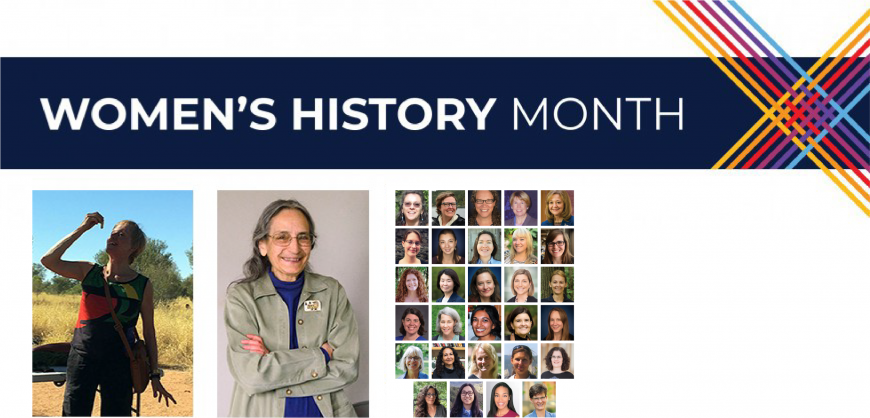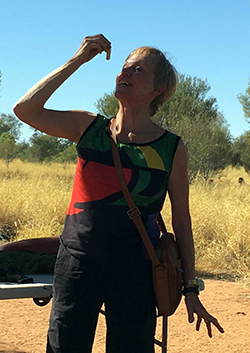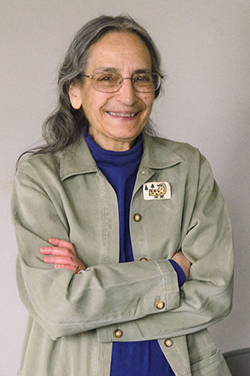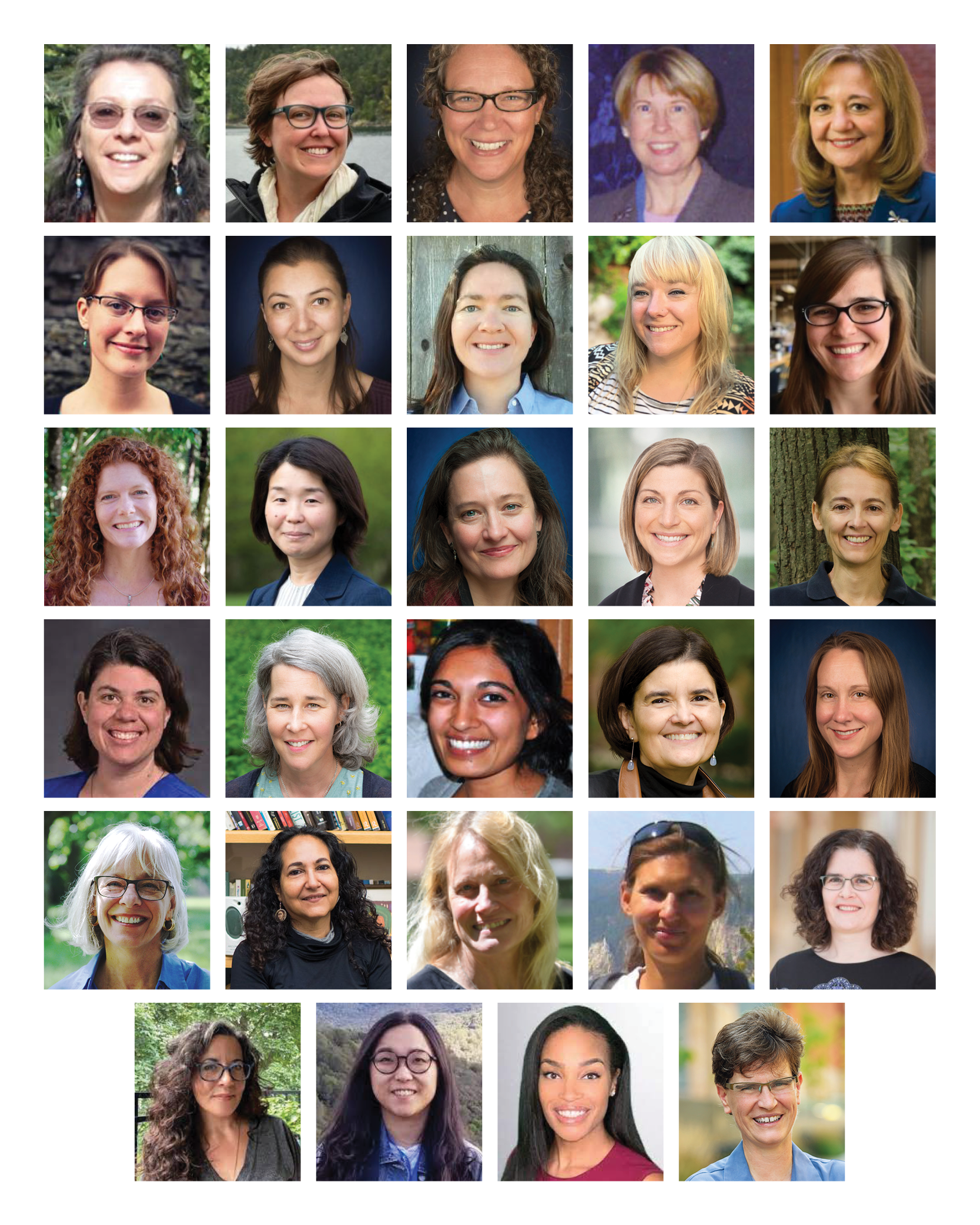
 back to all news
back to all news
Women's History Month: A Snapshot of Women Faculty, 1972/2022

In celebration of Women’s History Month, we honor the first two female faculty members at SEAS (then the School of Natural Resources), and fast forward to a snapshot of the women faculty, lecturers, and research scientists in 2022.
We also hope you’ll explore more from our series, Women’s History Month: Perspectives from SEAS Women in Sustainability:
- Voices of Faculty
- Voices of Master’s Students
- Voices of PitE Students
- Voices of Alumnae
- Nancy Arkin MLA: Open to Opportunities
- Professor Joan Nassauer: Much remains to be done
FIRST WOMEN FACULTY AT SEAS
Women and people of color had been largely unrepresented at the school until the late 1960s, when the first set of barricades came down. In 1967, female students were invited to join their male classmates at Camp Filibert Roth, and in 1972, Bobbi Low became the first full-time female professor on the School of Natural Resources faculty. In 1973, Rachel Kaplan would become the second woman to join, and that same year, an Affirmative Action Program was approved to increase the number of women in the student body and in the faculty.

PROFESSOR EMERITA BOBBI LOW
Years at SEAS: 1972-2018
Dr. Bobbi Low’s research centers on evolutionary and behavioral ecology, studying resource control and reproductive success in vertebrates (including humans). She integrates evolutionary theory and resource management, studies resources and reproductive variance, and reproductive and resource tradeoffs for modern women. Dr. Low authored, co-authored, and edited a number of important books, including Why Sex Matters: A Darwinian Look at Human Behavior (2000), Institutions, Ecosystems, and Sustainability (2001), Methods and Models in Evolution, Ecology, and Conservation Biology (2010).
In “10 Questions with Professor Bobbi Low” in 2017, Dr. Low was asked about her experience as the first full-time female faculty member.
“I had colleagues walk with me down the hall saying things like, ‘It's going to be interesting to see how everyone deals with you.’ And one day, after I had just moved down to this space in my little office, there was a knock on the door and this guy stuck his head in. He was from the University of Wisconsin, and he'd been here to give a forestry lecture. He looked at me for a second, cocked his head, and said, ‘I heard they hired a woman,’ and left.
“I think conditions for academic women are much better now, but any woman who assumes that you can just sort of ‘not worry about it’ is going to be disappointed.”—Bobbi Low, 2017

PROFESSOR EMERITA RACHEL KAPLAN
Years at SEAS: 1973-2015
A leader in the field of environmental psychology, Dr. Kaplan sought to understand the role the environment plays in helping people become more reasonable, effective, and psychologically healthy. Her work with husband Stephen Kaplan on Attention Restoration Theory, as it came to be known, influenced how generations of landscape architects and environmental psychologists view humanity’s relationship with nature. Her extensive list of scholarly publications includes The Experience of Nature: A Psychological Perspective (1989), With People in Mind: Design and Management of Everyday Nature (1998), and Fostering Reasonableness: Supportive Environments for Bringing Out Our Best (2015).
"Celebrating women's history provides a gratifying reminder of many profound changes in the academic community. Life at U-M was very different when I finished my PhD (1961), joined SEAS (then called SNR, 1973), and even when I officially retired (2015). Some years hence, when we look back on the current time of huge impacts related to the pandemic, I hope we will also be able to appreciate enormous progress in commitment to equity, inclusivity, humaneness, humility, and empathy with respect to fellow humans as well as the resources we all depend upon. Bringing out the best in each other will surely continue to depend on these acts and prosper with appropriate nudges." —Rachel Kaplan, 2021
FAST FORWARD TO 2022: WOMEN FACULTY, LECTURERS, AND RESEARCH SCIENTISTS
In the intervening years between 1972’s first woman faculty member and today’s roster, there have been scores of women on the SEAS faculty who continued to break new ground in their disciplines. In 2022—50 years since Bobbi Low began her SEAS career—there are 29 women, including faculty, lecturers and research scientists. Their accomplishments and contributions in research, teaching, and community engagement cross the spectrum of disciplines at SEAS—and beyond.
Women at SEAS have made significant impacts in advancing and creating knowledge in environmental justice, climate change, policy, fire science, forest ecology, human/wildlife interactions, life-cycle assessment, aquatic science, food systems, conservation, geospatial data science, landscape architecture—and multiple intersections of the sustainability fields.
Today, you'll find SEAS women making a real difference in the Great Lakes region, including communities in Detroit and Flint, and Up North in Michigan. Some, like the first woman to serve as dean, Professor Rosina Bierbaum, have affected climate policy in Washington, D.C., while others have focused their energies in New York City, Chicago, and throughout the American West and Alaska. Globally, their work has improved lives and livelihoods in Kenya, South Africa, Cameroon, Republic of Congo, India, Puerto Rico, and Mexico.
We invite you to learn more about the women on the SEAS faculty by clicking on their links below.
MEET TODAY'S WOMEN FACULTY, LECTURERS, AND RESEARCH SCIENTISTS AT SEAS

TOP ROW
Sara Adlerstein Gonzalez, Associate Research Scientist, Ecosystem Science & Management
Karen Alofs, Assistant Professor, Ecosystem Science and Management
M’Lis Bartlett, Lecturer, Env. Fellows Program Manager, Environmental Justice
Kathleen Bergen, Associate Research Scientist, Geospatial Data Sciences
Rosina Bierbaum, Professor and Dean Emerita, Environmental Policy & Planning
ROW (2)
Jennifer Blesh, Associate Professor, Ecosystem Science & Management
Silvia Cordero-Sancho, Lecturer, Geospatial Data Sciences, Ecosystem Science & Management
Stella Cousins, Research Scientist, Ecosystem Science & Management
Lisa DuRussel, Assistant Professor of Practice, Landscape Architecture
Lindsay Fercho, Lecturer, Landscape Architecture
ROW (3)
Alexandra Paige Fischer, Associate Professor, Behavior, Education, & Communication
Ayumi Fujisaki-Manome, Assistant Research Scientist, Geospatial Data Sciences
Rebecca D. Hardin, Associate Professor, Environmental Justice
Sara Hughes, Assistant Professor, Environmental Policy & Planning
Inés Ibáñez, Associate Professor, Ecosystem Science & Management
ROW (4)
Sarah Mills, Lecturer, Environmental Policy and Planning
Pamela Jagger, Associate Professor, Sustainability & Development
Meha Jain, Assistant Professor, Sustainability & Development
Maria Carmen Lemos, Professor, Sustainability & Development
Shelie Miller, Director, Program in the Environment, Jonathan W. Bulkley Collegiate Professor of Sustainable Systems; U-M Distinguished Faculty Fellow in Sustainability
ROW (5)
Joan Iverson Nassauer, Professor, Landscape Architecture
Ivette Perfecto, James E. Crowfoot Collegiate Professor of Environmental Justice, Ecosystem Science & Management
Catherine Riseng, Interim Director, Research Program Manager, Associate Research Scientist, Ecosystem Science & Management
Sheila Schueller, Lecturer & Academic Program Specialist, Ecosystem Science & Management
Sara Soderstrom, Associate Professor, Organizational Studies, Program in the Environment
ROW (6)
Amanda V. Szot, Lecturer, Landscape Architecture
Runzi Wang, Assistant Professor, Landscape Architecture
Brandy Brown, Lecturer, Environmental Justice
Michaela Theresia Zint, Professor, Associate Dean for Academic Affairs, Behavior, Education, & Communication

